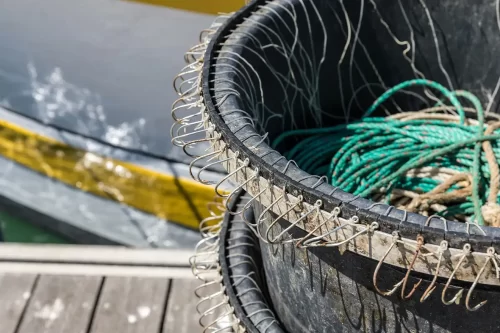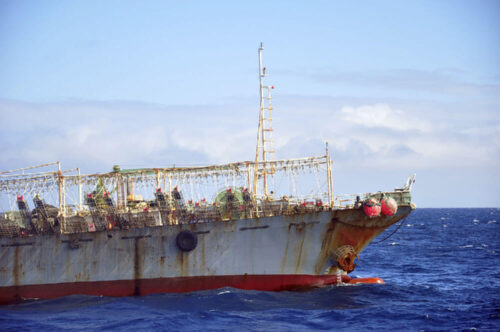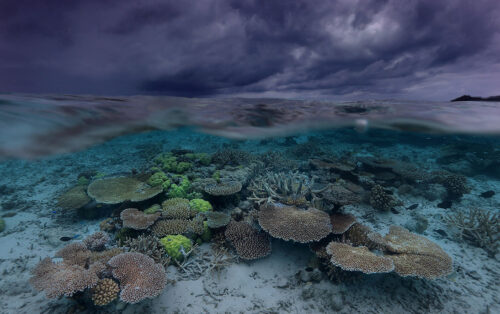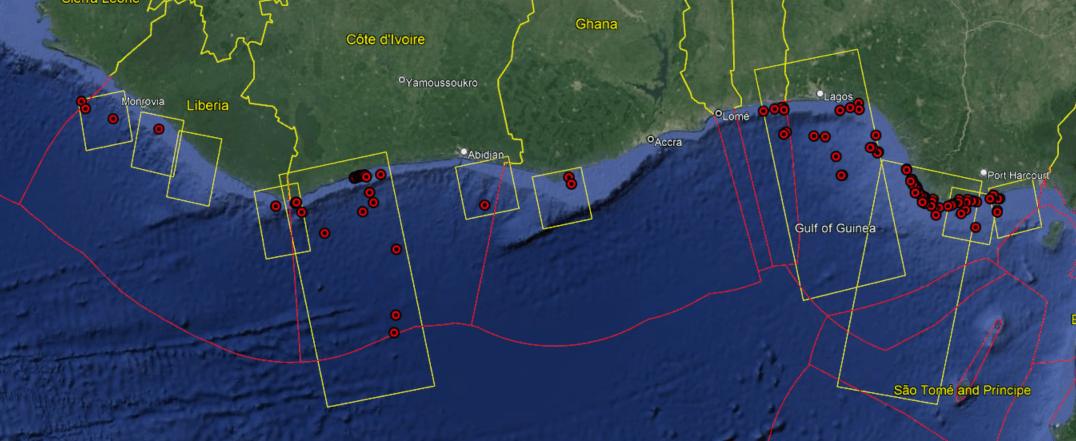The Joint Analytical Cell (JAC) had the opportunity to support the Africa Nemo 23.04 joint patrol in the Gulf of Guinea. The annual patrol is a collaborative effort led by the French Navy responsible for the Atlantic Area (CECLANT) and included the navies of Benin, Côte d’Ivoire, Ghana, Togo, Nigeria, the European Fisheries Control Agency (EFCA) and the interregional maritime security structure of the Yaoundé Architecture.
The Gulf of Guinea extends over 5,700 km of coastline from Senegal to Angola and has long been considered one of the most biodiverse marine environments in the world. The region provides an important source of food for its coastal States but has long been subject to illegal, unreported and unregulated (IUU) fishing that is estimated to result in an annual economic loss of over $2 billion. The region relies on cooperation and collaboration between States to effectively manage marine resources and to combat IUU fishing. Regional patrols like Africa Nemo 23.04 are a key aspect of this.
The Fisheries Committee for the West Central Gulf of Guinea (FCWC), through its Regional Monitoring Control and Surveillance Centre (RMCSC), participated in the patrol and worked to coordinate intel received from the JAC and EFCA to carry out daily analysis.
The FCWC is an important partner of the JAC and receives technical support through the West Africa Task Force (WATF) from one of the founding members, TMT.
The FCWC facilitates cooperation and collaborative fisheries management among the member countries that share several fish stocks. The RMCSC is the focal point for the region’s fisheries monitoring, control and surveillance (MCS) coordination and has a key role in supporting regional patrol operations.
The FCWC RMCSC is pleased to have played an active coordinating and intelligence provision role in Operation AFRICA NEMO 23.04, and will continue to support similar efforts in the future. We welcome the JAC support which provided crucial intelligence and capacity support to the operation, as well as the opportunity for the RMCSC to fulfil its role in linking relevant players involved in the operation. We are thankful to all Member States and partners for the excellent cooperation.
Dr. Antoine Gaston Djihinto,Secretary General - Fisheries Committee of the West Central Gulf of Guinea
The JAC was established in 2022 by the IMCS Network, Global Fishing Watch and TMT, and includes C4ADS and Skylight. The JAC provides authorities with fisheries intelligence, data analysis and capacity building to identify, understand and combat IUU fishing. The JAC importantly brings together a range of capabilities and expertise from the individual organizations that work collaboratively in a variety of ways to support national and regional fisheries MCS efforts.
Supporting national and regional patrol operations has been identified as a key priority for the JAC. Operation Africa Nemo 23.04 is one of several patrol operations that the JAC has supported over the past twelve months. By harnessing the complementary data, tools and expertise of the different JAC members, the JAC can tailor support in a way that responds to the needs of national and regional partners.
The member organizations of the JAC are extremely pleased to have cooperated with and supported the Africa Nemo patrols. Patrol support is a core area of JAC focus, and one which maximizes the technical assistance that the combined forces of the JAC can bring. The cooperation with the RMCSC is crucial, ensuring there are strong links between navies, coastal States, EFCA and the JAC, without which the ability to cross check and confirm key pieces of information and data would have been difficult, if not impossible.
Duncan Copeland,executive director, TMT
Africa Nemo 23.04 was a week-long patrol that commenced at the end of October 2023. Prior to the start of the patrol, the JAC was approached by the French Navy to provide support. The JAC provided analytical support that informed patrol decision-making during the planning and execution phases of the operation. This included data, information and insights that supported the identification of target vessels and priority areas for the patrol. This information also informed boarding inspection priorities using information on previous compliance issues. This type of intelligence is key to ensure patrols are targeted and effective and make the best use of limited and costly resources.
During the patrol operation, JAC analysts worked within the FCWC RMCSC to provide support to staff and facilitate direct engagement between the JAC and the RMCSC. RMCSC staff were provided with guidance to analyze and interpret remote sensing data, strengthening their capacity to provide similar support for future operations.
A closer look
For this operation, Global Fishing Watch, TMT and Skylight combined their unique capabilities to deliver robust data and information to support the patrol.
The pre-operation analysis undertaken by the JAC provided the basis to brief all patrol stakeholders on key findings. The analysis combined Global Fishing Watch’s AIS-based vessel movements and events data with analytical expertise, vessel history data and regional insights from TMT. These were used to identify potentially relevant vessels operating in the patrol area; trends and patterns in vessel operations; vessels of interest, based on previous compliance issues or operating patterns; and known key risk factors in each country and fleet. To support this, Global Fishing Watch generated a list of fishing, carrier and bunker vessels present in the patrol area over the preceding 12 months. Vessels of interest were identified using machine learning derived vessel type and registry data. This data was then analyzed by TMT using a combination of raw AIS data and TMT’s FACT database to ensure all relevant vessels were identified for the patrol.
Global Fishing Watch’s AI-derived events data—fishing, encounters, AIS gaps—was then used to identify patterns of vessel behavior across the patrol area. This was complemented by mapping of uncorrelated synthetic aperture radar (SAR) detections, to identify the distribution and hotspots of vessels not transmitting on AIS.
To add vessel-level insights to this analysis of broad operating patterns, manual analysis of AIS data was undertaken to identify any vessels or fleets exhibiting behavior of interest. TMT also cross-referenced the vessel list with vessel operational history from its internal FACT database, to identify any vessels with a history of noncompliance so that these could be prioritized for inspection if encountered. This supported the identification of trends in the types of compliance issues seen across different countries and vessels, which was used to further refine the identification of areas of interest and inspection priorities. Key risks common across the region include fishing without authorization, fishing in prohibited areas or with prohibited gears.
Intelligence support during the live phase of the operation included the provision of commercial remote sensing data—SAR and radio frequency—by Skylight and on-site access to key data sources, including AIS and AIS-derived events data through Skylight’s real-time platform.
Embedding JAC support during the operational phase in the RMCSC facilitated the integration of data provided by the JAC with other key data sources and platforms used by the RMCSC and national authorities. These include the Yaoundé Architecture Regional Information System (YARIS) communication platform, the WATF Basecamp communication platform, national VMS data and vessel licence information. YARIS and Basecamp provided mechanisms to facilitate communication between states participating in African Nemo 23.4, including requesting and sharing information which supported timely responses to developments on the water.
Regional patrol operations require effective collaboration and communication and access to a range of data and information to inform priority areas and vessels for surveillance and inspection. The JAC has welcomed the opportunity to work with several national agencies and regional organizations over the past 12 months and support their efforts to combat IUU fishing. It is only by working together can we hope to reduce IUU fishing and protect marine resources for the benefit of our country partners.
You might also like...

Advances in Satellite Radar Analysis Help Reveal Fishing Activity

Data advances understanding of global squid fishing fleets

